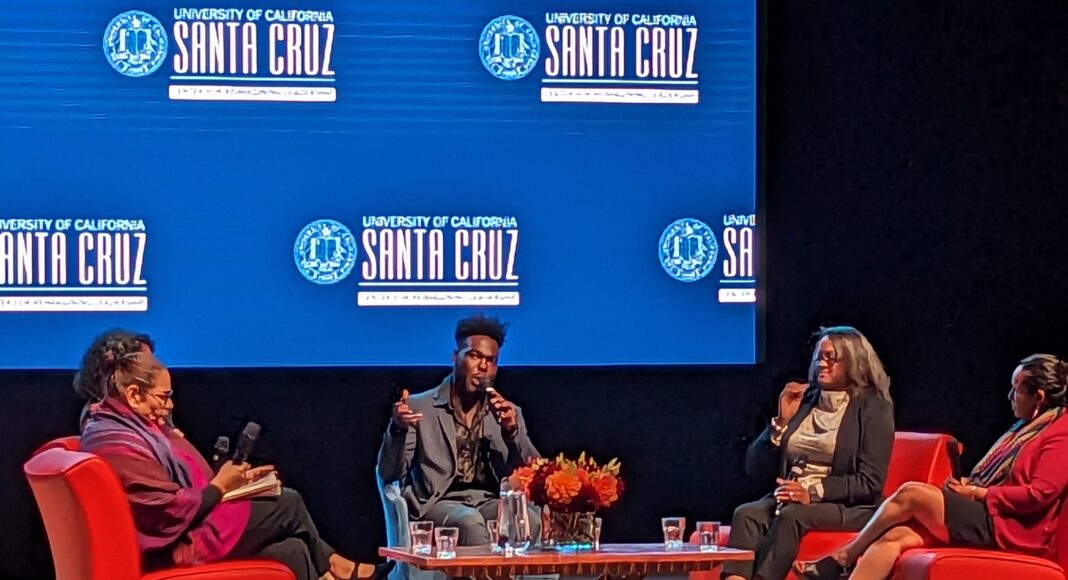Around 2,500 students packed the Quarry Amphitheatre at U.C. Santa Cruz on the evening of Oct. 3. to hear an inspiring panel of local community leaders discuss their experiences as organizers responding to the Pajaro floods earlier this year.
“Voices of Pajaro” was organized by the Center for Reimagining Leadership. The event included musical performances by local artists and aimed to bridge the gap between the South County/Pajaro community and the student body.
The all-women panel was moderated by national organizer Ayo Banjo, a UCSC alum, and included United Way Santa Cruz CEO Keisha Browder; Esperanza Community Farms co-director Mireya Gomez-Contreras; Community Action Board executive director Maria Elena De La Garza and UCSC professor of Ecology and Evolutionary Biology Erika Zavaleta.
Watsonville-based corrido band Linea Distinguida electrified the crowd to start off the night before the tone turned to a more somber topic.
On March 11 2023, the levee of the Pajaro River failed after weeks of torrential rains and flooded the town of Pajaro. Over 2,000 families were displaced in a community that’s predominantly made up of immigrant farmworkers. The slow response from state and federal officials to the disaster that unfolded—made more apparent in comparison to the faster response to flooding in the Santa Cruz area—left the Pajaro community to fend for itself.
To give the audience a sense of the people who were affected, a video showcasing the flood damage to homes in Pajaro and the families that resided in the community was projected on a giant screen behind the panelists. The video was shot by Mireya Gomez-Contreras, who grew up in Watsonville.
“I get very emotional because…’Fuck!’, right?” Gomez-Contreras said, explaining her feelings towards the situation as she struggled to compose herself. “That’s a little bit about who I am, I’m driven by the emotion because that shouldn’t be what’s happening.”
In the aftermath of the flood, Gomez-Contreras’ organization mobilized to provide assistance to flood victims. All panelists agreed there was an inadequate response from officials at all levels.
“There was a lack of coordinated response,” Maria Elena De La Garza said.
Many families that were evacuated only spoke Spanish and some only spoke Mixteco or other indigenous Mexican languages. De La Garza tried to convey to the audience the state of fear they felt as they were scared, confused and soaking wet.
The speakers considered systemic racism a factor contributing to the disparate emergency responses between the poorer Pajaro and the more affluent and predominantly caucasian Santa Cruz area.
While the panel talked about their experiences as leaders during a catastrophe, the message that they wanted to get across was the need for greater localized community action. A community, they said, UC Santa Cruz students also form a part of.
De La Garza encouraged students to venture into Watsonville and get to know the South County community.
“You gotta get off the hill,” De La Garza said. “I guarantee that you will be accepted with open arms because we need you. We need you when there’s a crisis and we need you when there’s not a crisis.”
As a former student at UCSC, Ayo Banjo understood how daunting it can be to get involved in a new community.
“How do we actually be community allies, especially if you’re not from this community?” Banjo asked the panel.
De La Garza told the students that everyone can contribute in their own way and find out what that “granito de arena” (grain of sand) is.
Mireya Gomez-Contreras told the students that being in a leadership role is not easy.
“It’s a double-edged sword,” she said.
But Gomez-Contreras is compelled to do the work out of an abundance of love for her community and said that is what drives her. “I can’t help it,” she said.
De La Garza felt optimistic about the incoming cohort of students and their potential contribution to the community, as well as their impact on government policy and emergency response.
“We need to make it happen and I’m expecting it to happen,” De La Garza said.













